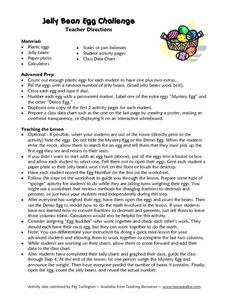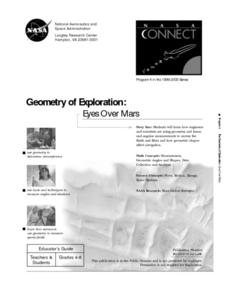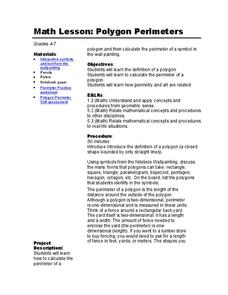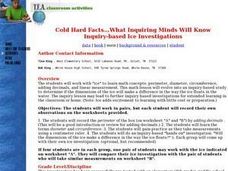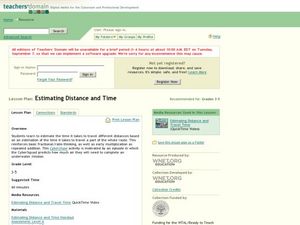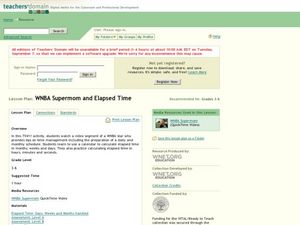Curated OER
Mush! Tracking Travelers on the Trail
Students get to know Alaska and the Iditarod route that is run by dogs as they track the mushers' progress on a map that they create specifically for the race. They learn about latitude, longitude, plotting on a map, checkpoints, and...
Curated OER
Jelly Bean Egg Challenge
Students each receive a plastic egg filled with jelly beans. In this Jelly Bean Egg Challenge, students estimate and weight their eggs, they count the number of jelly beans inside their egg, they chart their data and compare their data...
Curated OER
Which Way Did He Go?
In this visual thinking worksheet, 5th graders determine which of three routes that Max should take to get to a party by noon. Students answer 10 fill in the blank questions relating to different amounts of time and miles.
Curated OER
Sizing Up Spout
Students estimate heights and lengths of objects. In this measurement lesson, students estimate the length and height of various objects using non-traditional tools of measurement. This lesson also includes a video clip on measurement.
Curated OER
Geometry of Exploration: Eyes Over Mars
Students research how engineers and scientists generate linear and angular measurements with geometry to survey the Earth and Mars. They assess how geometric shapes affect navigation. A surveyor comes to the classroom and explains how he...
Curated OER
Central Tendency
Fifth graders compare and contrast different sets of data on the basis of measures of central tendency.
Curated OER
Polygon Perimeters
Students complete worksheets where they calculate the perimeter of polygons. In this perimeter of polygons lesson plan, students divide complex shapes into simple shapes to find the perimeter.
Curated OER
Catching a Kidnapper
Students measure different body parts and find body matches to different parts. In this measurement lesson plan, students watch the video Catching the Kidnapper where they see how measurement of different body parts can match a criminal....
Curated OER
Cold Hard Facts? What Inquiring Minds Will Know -- Inquiry-Based Ice Investigations
Students are introduced to the concepts of perimter, diameter, circumference and measurements. In groups, they complete two worksheets in which they determine if the ice dimensions make a difference in the way it floats. They discuss...
Curated OER
Calculating Elapsed Time
Students calculate elapsed time in a series of activities. In this calculating time lesson, students view a Cyberchase video that demonstrates how to calculate elapsed time. Activities include counting, subtracting and regrouping in base...
Curated OER
Elapsed Time and Scheduling
Students improve their time management by watching a video segment of a busy student making a schedule. In this elapsed time and scheduling lesson, students create their own schedules and learn to calculate elapsed time in both digital...
Curated OER
Estimating Distance and Time
Students analyze a Cyberchase video to help them understand how to estimate the time it takes to travel distances. In this time lesson, students use ratiosand repeated addition to calculate how much air the characters in...
Curated OER
If you have to find the area of a region, how would you calculate it?
Fifth graders find the area of rice farms. In this area instructional activity, 5th graders draw shapes and grid them to find the area. They compare different rice fields to see which one takes up more space and has the larger area.
Curated OER
Crop Circles
Students calculate the area and circumference of a circle. In this geometry lesson, students solve word problems with circles and create formulas to calculate the area. They find the rate and complex area of a circle.
Alabama Learning Exchange
The State Capital of Stem and Leaf
Students explore the concept of stem and leaf plots. In this stem and leaf plots lesson, students plot the 50 US states' capitals on a stem and leaf plot according to the first letter of each state. Students compare...
Curated OER
Finding Averages as Means
Students calculate the mean. In this activity on averages, students watch a video on athletes and averages and complete a worksheet. This activity emphasizes mean as the "fair share measure of center".
Curated OER
Introducing Decimals and Decimal Addition
Students explore equivalence of fractional tenths and decimals. For this Cyberchase decimals lesson, students repair a railroad track that Hacker continuously sabotages. The tracks are measured in decimal lengths, so the CyberSquad...
Curated OER
Estimation
Students estimate time and amounts when counting is not realistic or feasible. In this estimation lesson, students estimate time or amounts. This lesson includes two video clips on estimation and a worksheet for independent practice.
Curated OER
WNBA Supermom and Elapsed Time
Young scholars watch a video of an WNBA athlete to learn about calendar scheduling and elapsed time. In this time management lesson, students watch the video for the WNBA athlete. Young scholars record tips about time management and then...
Curated OER
Let It Rain
Students study the effects of water erosion on soil by gathering and analyzing data during an experiment. They decide on appropriate units of measurement to apply in problem solving.
Curated OER
Heavier or Lighter
Math comes alive in this interactive lesson, which prompts students to weigh small classroom-available items (erasers, pencils, rulers) as well as more obscure items that would need to be provided (a basket, a small toy car). Students...
Curated OER
Visualizing Multiplication
Upper graders represent multiplication of a two-digit number by a two-digit number as the area of a rectangle with dimensions of the two factors. They find patterns for the number of different base ten blocks in a rectangle representing...
Curated OER
Chances Are
Upper graders examine the concept of probability. They collect data and create a bar graph. They must interpret the data as well. Everyone engages in hands-on games and activities which lead them to predict possible outcomes for a...
Curated OER
Fish Communities in the Hudson
Learning to read data tables is an important skill. Use this resource for your third, fourth, or fifth graders. Learners will will study tables of fish collection data to draw conclusions. The data is based on fish environments in the...

